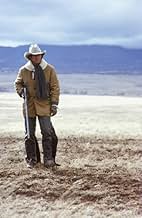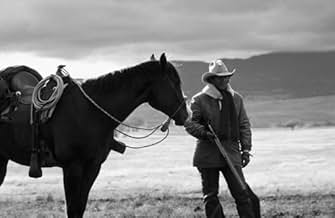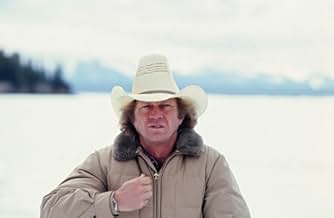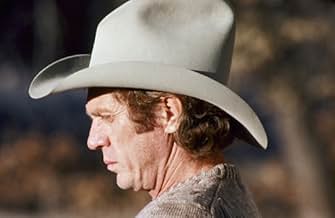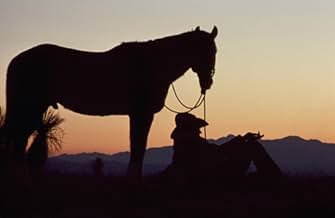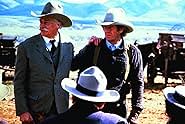IMDb रेटिंग
6.8/10
6.4 हज़ार
आपकी रेटिंग
अपनी भाषा में प्लॉट जोड़ेंAn ex-army scout is hired by ranchers to kill cattle rustlers but he gets into trouble with the corrupt local officials when he's suspected of killing a boy.An ex-army scout is hired by ranchers to kill cattle rustlers but he gets into trouble with the corrupt local officials when he's suspected of killing a boy.An ex-army scout is hired by ranchers to kill cattle rustlers but he gets into trouble with the corrupt local officials when he's suspected of killing a boy.
Elisha Cook Jr.
- Stablehand
- (as Elisha Cook)
फ़ीचर्ड समीक्षाएं
This is unfairly forgotten western from the decade were western were slowly dying until the 1985. " Tom Horn" deserves more praise , since this is a good western and one of last movies of Steve McQueen. It's his last good movie.
The movie is full of brilliant dialogues. I don't remember when was the last time I have seen a movie where almost every exchange is intelligent and funny. The movie is worth watching for the dialogues alone.
The story is a little predictable , but the movie is well directed by William Wiard and grips you from start to finish. I felt sad at the end and that was the whole point.
The movie made me sad , because it was not only the goodbye to Tom Horn, but also to Steve McQueen ("Papillon") . Both were heroes from the past that were slowly dying in a changing world that didn't need them. McQueen did make one more movie after this one , but for me this is his good bye. A good movie and a great farewell to wonderful actor.
I give it 7/10.
The movie is full of brilliant dialogues. I don't remember when was the last time I have seen a movie where almost every exchange is intelligent and funny. The movie is worth watching for the dialogues alone.
The story is a little predictable , but the movie is well directed by William Wiard and grips you from start to finish. I felt sad at the end and that was the whole point.
The movie made me sad , because it was not only the goodbye to Tom Horn, but also to Steve McQueen ("Papillon") . Both were heroes from the past that were slowly dying in a changing world that didn't need them. McQueen did make one more movie after this one , but for me this is his good bye. A good movie and a great farewell to wonderful actor.
I give it 7/10.
My wife thinks this movie is a dirty portrayal of the West. Historians will argue about Horn and the events that happen in this film, but I like it. Do not watch the edited tv version, to get the real brutal feel of this film rent it. It is a good portrayal of how dirty and nasty the frontier really was. The end suits this film very well, and if my wife can watch an entire Western the film is well done.
Tom Horn is directed by William Wiard and adapted to screenplay by Thomas McGuane and Bud Schrake from Horn's own autobiography. It stars Steve McQueen, Linda Evans, Richard Farnsworth, Billy Green Bush and Slim Pickens. Music is by Ernest Gold and cinematography by John A. Alonzo.
Plot finds McQueen as legendary army tracker - turned hired gun - Tom Horn, who is hired by Wyoming ranchers to see off cattle rustlers, only to see them turn against him when his methods threaten their reputation.
As a big fan of both Westerns as a genre and McQueen (in the process of getting the cancer that would kill him) the actor, it's tricky trying to review Tom Horn (and his final film "The Hunter") without the heart ruling the head. Fact is, is that Tom Horn is not the glorious hard hitting Tom Horn picture that the character demands. It looks fabulous, is very melancholic, and McQueen is genuinely affecting in his performance, but the production problems (various attached directors, rewrites etc) are evident and give us a film of what might have been.
Nonetheless, this is no stinker, in fact, it's a very reflective piece dealing with a man out of his time - and he knows it. The narrative is strong on the end of the so called Wild West, a changing of the times, where law and order is about to finally become the dominant force. Horn was the man who helped bring in the mighty Geronimo, which gives the makers a chance to not only nod towards respect for the great Apache chief as a plot device, but to also let Horn, in McQueen's hands, show us a resignation of time being up for his kind.
One dodgy "special effect" aside, when the violence is required for the story it is an adrenaline jolt, this is because the tone of the piece is ultimately sombre. The hazy romantic thread between Horn and Glendolene Kimmel (Evans is fine in a thankless role) is suffering from flashback overkill, but the tender feel to it sits comfortably within the pic's earnest intention. The political aspects strike the required chord for narrative worth, and the key aspect of Horn's ultimate fate being based on fact or otherwise? is deftly handled.
Poor editing and a number of "time filling shots" grate a little, and if not prepared for a sombre pic then this will disappoint. Yet there's a lot of beauty here and if you be a fan of McQueen or not, his turn is brave, committed and very engaging. 7/10
Plot finds McQueen as legendary army tracker - turned hired gun - Tom Horn, who is hired by Wyoming ranchers to see off cattle rustlers, only to see them turn against him when his methods threaten their reputation.
As a big fan of both Westerns as a genre and McQueen (in the process of getting the cancer that would kill him) the actor, it's tricky trying to review Tom Horn (and his final film "The Hunter") without the heart ruling the head. Fact is, is that Tom Horn is not the glorious hard hitting Tom Horn picture that the character demands. It looks fabulous, is very melancholic, and McQueen is genuinely affecting in his performance, but the production problems (various attached directors, rewrites etc) are evident and give us a film of what might have been.
Nonetheless, this is no stinker, in fact, it's a very reflective piece dealing with a man out of his time - and he knows it. The narrative is strong on the end of the so called Wild West, a changing of the times, where law and order is about to finally become the dominant force. Horn was the man who helped bring in the mighty Geronimo, which gives the makers a chance to not only nod towards respect for the great Apache chief as a plot device, but to also let Horn, in McQueen's hands, show us a resignation of time being up for his kind.
One dodgy "special effect" aside, when the violence is required for the story it is an adrenaline jolt, this is because the tone of the piece is ultimately sombre. The hazy romantic thread between Horn and Glendolene Kimmel (Evans is fine in a thankless role) is suffering from flashback overkill, but the tender feel to it sits comfortably within the pic's earnest intention. The political aspects strike the required chord for narrative worth, and the key aspect of Horn's ultimate fate being based on fact or otherwise? is deftly handled.
Poor editing and a number of "time filling shots" grate a little, and if not prepared for a sombre pic then this will disappoint. Yet there's a lot of beauty here and if you be a fan of McQueen or not, his turn is brave, committed and very engaging. 7/10
Interesting but boring Western about the last days of a real-life Wyoming gunslinger named Tom Horn with Steve McQueen in the title role. The movie has its moments here and there but results to be a little bit tiring and slow-moving . It's a melancholy chronicle and near bittersweet dealing with the last exploits of Horn who is shown as hired hand to eliminate some rustlers . Good support cast who provides the best moments as Richard Farnsworth as old-timer who hires Horn , Slim Pickens and Billy Green Bush , both of them as Sheriffs , furthermore a beautiful Linda Evans and brief performance by the eternal secondary Elisha Cook Jr . Marvelously filmed by the classic cameraman John A Alonzo and good musical score by Ernest Gold . The motion picture produced by McQueen and Fred Weintraub is professionally -though with no originality- directed by William Wiard.
The picture is based on true events , the deeds are the following : Although his official title was always "Range Detective", he actually functioned as a killer for hire. In 1900 he was implicated in the murder of two known rustlers and robbery suspects in northwest Colorado. During his involvement in the Wilcox Train Robbery investigation, Horn obtained information from Bill Speck that revealed which of the robbers had killed Sheriff Josiah Hazen, who had been shot and killed during the pursuit of the robbers. He passed this information on to Charlie Siringo, who was working the case by that time for the Pinkerton's. He left that line of work briefly to serve a stint in the Army during the Spanish American War. Before he could steam from Tampa for Cuba, he contracted malaria. When his health recovered he returned to Wyoming. Shortly after his return, in 1901, Horn began working for wealthy cattle baron John C. Coble .Willie Nickell murder, Horn's arrest and trial. On July 18, 1901, Horn was once again working near Iron Mountain when Willie Nickell, the 14-year-old son of a sheepherding rancher, was murdered. Horn was arrested for the murder after a questionable confession to Joe Lefors, an office deputy in the US Marshal's office, in 1902. Horn was convicted and hanged in Cheyenne in 1903 .During Horn's trial, the prosecution introduced a vague confession by Horn to Lefors, taken while he was intoxicated. Only certain parts of Horn's statement were introduced, distorting the significance of the statement. Additionally, testimony by at least two witnesses, including lawman Lefors, was presented by the prosecution, as well as circumstantial evidence that only placed him in the general vicinity of the crime scene.Glendolene M. Kimmell, a school teacher who knew the Miller family, testified on the Millers behalf during the Inquest.It is still debated whether Horn committed the murder. Some historians believe he did not, while others believe that he did, but that he did not realize he was shooting a boy. Whatever the case, the consensus is that regardless of whether he committed that particular murder, he had certainly committed many others. Chip Carlson, who extensively researched the Wyoming v. Tom Horn prosecution, concluded that although Horn could have committed the murder of Willie Nickell, he probably did not. According to Carlson's book Tom Horn: Blood on the Moon, there was no actual evidence that Horn had committed the murder, he was last seen in the area the day before the murder, his alleged confession was valueless as evidence, and no efforts were made to investigate involvement by other possible suspects. In essence, Horn's reputation and history made him an easy target for the prosecution. Execution Tom Horn has the distinction of being one of the few people in the "Wild West" to have been hanged by an automated process. A Cheyenne architect named James P. Julian designed the contraption in 1892, earning the name "The Julian Gallows", which made the condemned man hang himself. The trap door was connected to a lever which pulled the plug out of a barrel of water. This would cause a lever with a counterweight to rise, pulling on the support beam under the gallows. When enough pressure was applied, this would cause the beam to break free, opening the trap and hanging the condemned man. Tom Horn was buried in the Columbia Cemetery in Boulder, Colorado.
The picture is based on true events , the deeds are the following : Although his official title was always "Range Detective", he actually functioned as a killer for hire. In 1900 he was implicated in the murder of two known rustlers and robbery suspects in northwest Colorado. During his involvement in the Wilcox Train Robbery investigation, Horn obtained information from Bill Speck that revealed which of the robbers had killed Sheriff Josiah Hazen, who had been shot and killed during the pursuit of the robbers. He passed this information on to Charlie Siringo, who was working the case by that time for the Pinkerton's. He left that line of work briefly to serve a stint in the Army during the Spanish American War. Before he could steam from Tampa for Cuba, he contracted malaria. When his health recovered he returned to Wyoming. Shortly after his return, in 1901, Horn began working for wealthy cattle baron John C. Coble .Willie Nickell murder, Horn's arrest and trial. On July 18, 1901, Horn was once again working near Iron Mountain when Willie Nickell, the 14-year-old son of a sheepherding rancher, was murdered. Horn was arrested for the murder after a questionable confession to Joe Lefors, an office deputy in the US Marshal's office, in 1902. Horn was convicted and hanged in Cheyenne in 1903 .During Horn's trial, the prosecution introduced a vague confession by Horn to Lefors, taken while he was intoxicated. Only certain parts of Horn's statement were introduced, distorting the significance of the statement. Additionally, testimony by at least two witnesses, including lawman Lefors, was presented by the prosecution, as well as circumstantial evidence that only placed him in the general vicinity of the crime scene.Glendolene M. Kimmell, a school teacher who knew the Miller family, testified on the Millers behalf during the Inquest.It is still debated whether Horn committed the murder. Some historians believe he did not, while others believe that he did, but that he did not realize he was shooting a boy. Whatever the case, the consensus is that regardless of whether he committed that particular murder, he had certainly committed many others. Chip Carlson, who extensively researched the Wyoming v. Tom Horn prosecution, concluded that although Horn could have committed the murder of Willie Nickell, he probably did not. According to Carlson's book Tom Horn: Blood on the Moon, there was no actual evidence that Horn had committed the murder, he was last seen in the area the day before the murder, his alleged confession was valueless as evidence, and no efforts were made to investigate involvement by other possible suspects. In essence, Horn's reputation and history made him an easy target for the prosecution. Execution Tom Horn has the distinction of being one of the few people in the "Wild West" to have been hanged by an automated process. A Cheyenne architect named James P. Julian designed the contraption in 1892, earning the name "The Julian Gallows", which made the condemned man hang himself. The trap door was connected to a lever which pulled the plug out of a barrel of water. This would cause a lever with a counterweight to rise, pulling on the support beam under the gallows. When enough pressure was applied, this would cause the beam to break free, opening the trap and hanging the condemned man. Tom Horn was buried in the Columbia Cemetery in Boulder, Colorado.
I often wonder how pre video audiences were able to take in the full effect and minor nuances of films as we can today. Watching a film again and again allows one to really study the work and pick up the director's deep intent for character and plot.
Watching Tom Horn a few times allows one to see that it really is a good movie. And after more than 20 years in motion pictures, McQueen finally just fits into his role, and does not "act" or play Steve McQueen.
The first scenes are excellent. McQueen establishes his character as a man who knows, and has seen most of, what the west is about. He knows who he is, and what he's accomplished, so he doesn't need to brag. The way he virtually walks into a fight in the bar with the pompous British fighter and his manager is superb. "Well, if he ain't won the fight yet, then he ain't the champ yet" is delivered with believable aplomb. When he says the guy's mother would have to stand on his shoulders just to kiss Geronimo's ass it is priceless. Especially good is his question "OK, if I win this fight, then does that make ME champion of the world?" He knows he is going to get his butt kicked but does all this for principle's sake. His running out the door and yelling oh s***, then throwing the plate of food at the fighter is one of the better acting sequences done anywhere.
His work as the stock detective is classic McQueen without his earlier years of mugging and panning. Good stuff.
The open spaces of this film, and Horn's subsequent incarceration gave me a feeling of freedom and claustrophobia. It worked well
Watching Tom Horn a few times allows one to see that it really is a good movie. And after more than 20 years in motion pictures, McQueen finally just fits into his role, and does not "act" or play Steve McQueen.
The first scenes are excellent. McQueen establishes his character as a man who knows, and has seen most of, what the west is about. He knows who he is, and what he's accomplished, so he doesn't need to brag. The way he virtually walks into a fight in the bar with the pompous British fighter and his manager is superb. "Well, if he ain't won the fight yet, then he ain't the champ yet" is delivered with believable aplomb. When he says the guy's mother would have to stand on his shoulders just to kiss Geronimo's ass it is priceless. Especially good is his question "OK, if I win this fight, then does that make ME champion of the world?" He knows he is going to get his butt kicked but does all this for principle's sake. His running out the door and yelling oh s***, then throwing the plate of food at the fighter is one of the better acting sequences done anywhere.
His work as the stock detective is classic McQueen without his earlier years of mugging and panning. Good stuff.
The open spaces of this film, and Horn's subsequent incarceration gave me a feeling of freedom and claustrophobia. It worked well
क्या आपको पता है
- ट्रिवियाFilmed at the beginning of 1979, Steve McQueen was already very ill with cancer. He had difficulty breathing, and began coughing up blood towards the end of filming, but assumed he had pneumonia.
- गूफ़In the opening sequence, the wording says, "In 1901 he drifted into Wyoming 'Territory'". Wyoming had been a state since 1890.
- भाव
U.S. Marshal Joe Belle: Do you know who I am?
Tom Horn: No.
U.S. Marshal Joe Belle: What you were in the Southwest, I was in the Northwest.
Tom Horn: I was mostly out of work.
- इसके अलावा अन्य वर्जनUK cinema and video versions were cut by 39 secs by the BBFC to remove a horse-fall and to edit a scene of a man's head being blasted during a gunfight. The 2006 DVD release restores some cuts and is only missing 6 secs of the horse-fall.
- कनेक्शनFeatured in Steve McQueen: The Essence of Cool (2005)
टॉप पसंद
रेटिंग देने के लिए साइन-इन करें और वैयक्तिकृत सुझावों के लिए वॉचलिस्ट करें
- How long is Tom Horn?Alexa द्वारा संचालित
विवरण
बॉक्स ऑफ़िस
- बजट
- $30,00,000(अनुमानित)
- चलने की अवधि
- 1 घं 38 मि(98 min)
- ध्वनि मिश्रण
- पक्ष अनुपात
- 2.39 : 1
इस पेज में योगदान दें
किसी बदलाव का सुझाव दें या अनुपलब्ध कॉन्टेंट जोड़ें


